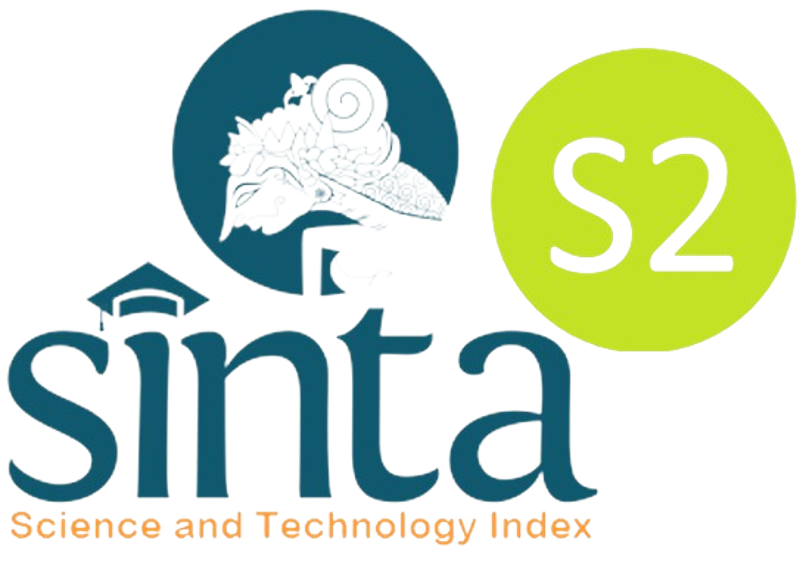Professional Development of Novice English Teacher in Junior High School
Abstract
Abstract: Professional Development of Novice English Teacher in Junior High School. Objectives: This study aimed at finding out novice English teacher’s understanding about professional development in a junior high school in Palembang, novice teacher’s professional development, its challenges, how challenges are met, and supports provided by school and government. Methods: In this qualitative case study, the data were collected through questionnaires, interview, and documentation and were analyzed by using Likert Scale, transcription, codification, and thematic analysis. The participants were an English novice teacher, a senior teacher, and vice principle of curriculum affair. Findings: Regardless of her good understanding, the novice teacher lacked of professional development. She encountered instructional, social status and identity, classroom management and workload challenges, which were met by joining subject teachers' forum, while advices and consent to join teachers’ forum were given as school support. Conclusion: Novice teacher should understand and apply professional development in her career.
Keywords: professional development, novice teacher, English teacher.
Abstrak: Professional Development of Novice English Teacher in Junior High School. Tujuan: Penelitian ini bertujuan untuk mengetahui pemahaman guru pemula tentang pengembangan profesional, pengembangan profesional yang diadapatkan, tantangannya, cara menghadapinya, dan dukungan yang diberikan sekolah dan pemerintah. Metode: Dalam penelitian kualitatif studi kasus ini data diperoleh melalui kuesioner, wawancara, dan dokumentasi. Peserta penelitian adalah seorang guru pemula Bahasa Inggris (masa kerja 4 tahun), seorang guru senior (masa kerja 20 tahun), dan wakil kepala sekolah bidang kurikulum disebuah SMP di Palembang dan dianalisis menggunakan Likert Scale, transkripsi, kodifikasi, dan analisis tematik. Temuan: Terlepas dari pemahamannya yang baik, guru pemula ini kurang mendapatkan pengembangan profesional. Dia menghadapi tantangan instruksional, status social dan identitas, manajemen kelas dan beban kerja, yang diaatasi dengan mengikuti kegiatan MGMP,sementara dukungan dari sekolah diberikan dalam bentuk izin mengikuti kegiatan MGMP dan nasihat. Kesimpulan: Sudah seharusnya guru pemula memahami dan melakukan pengembangan keprofesionalan dalam karirnya.
Kata kunci: pengembangan profesional, guru pemula, guru Bahasa Inggris.
Full Text:
PDFReferences
Adawi, S. S. A. A. (2017). Exploring the effectiveness of implementing seminars as a teaching and an assessment method in a children’s literature course. English Language Teaching,10(11).1-14
Avalos, B. (2011). Teacher professional development in teaching and teacher education over ten years.Teaching and Teacher Education,27(1),10-20.
Aydin, I., Demir, T. G., & Erdemli, O. (2015). Teacher’s views regarding the social status of the teaching profession. Anthropologist,22(2),146-156.
Barrett, J., Jones, G., Mooney, E., Thornton, C., Cady, J. Guinee, P., Olson, J. (2002). Working with novice teachers: Challenges for Professional Develop-ment. Mathematics Teacher Education and Development, 4, 15 -27
Boakye, C., &Ampiah, J. G. Challenges and solutions: The experiences of newly qualified science teachers. SAGE Open, 1-10.
British Council. (2015). Continuing professional development (CPD) framework for teachers. Retrieved from http://www.teachingenglish.org.uk/teacherdevelopment/continuing-professional-development.
Depdiknas.(2003). Undang-undang RI No.20 tahun 2003.tentang system pendidikan nasional. Retrieved from https://kelem-bagaan.ristekdikti.go.id
Depdiknas.(2005). Undang-undang RI No.14 tahun 2005.tentang guru dan dosen. Retrieved from https://kelembagaan. ristekdikti.go.id
Depdiknas.(2007). Undang-undang RI No.16 tahun 2007.tentangstandarkualifikasi akademikdankompetensi guru. Retrieved from https://kelembagaan.Ristekdikti.go .id
Depdiknas.(2009). Undang-undang RI No.16 tahun 2009.tentang jabatan fungsional guru dan angka kredit. Retrieved from https://kelembagaan.ristekdikti.go.id
Duff, D. (2016). Writing for publication. AXON,22(4),36-39
EF EPI.(2016). Education first English proficiency index 6th. Retrieved from www.ef.com/epi.
Jabbarifar, T. (2009). The important of classroom assessment and evaluation in educational system. The 2nd International Conference of Teaching and Learning (ICTL), INTI University. Malaysia: Semanticscholar.
Kadarwati, A. (2016). The improvement of teaching-learning quality through academic supervision with a classroom visit technique. JurnalStudiSosial,1(2), 103-120.
Kemendikbud.(2014, September). Laporan hasil ujian nasional tahun 2014. Pusat Penelitian Pendidikan, 1-190.
Kementerian Pendidikan Nasional.(2010). Rencana strategis Kementerian Pen-didikan Nasional 2010-2014. Jakarta: Indonesia. Retrieved from http://www. psp.kemendiknas.go.id/uploads/statistik%20pendidikan/0910/index_sma_0910.pdf.
Kim, K. & Roth, G. (2011). Novice teacher and their acquisition of work-related information. Current Issues in Education,14(1).
Kovacs, H. (2017). Learning and teaching in innovation:why it is important for education in 21st century. Retrieved from https://www.researchgate.net/ publication/318089803.
Mbise, A. S. (2008). Early childhood service delivery mapping and baseline study in Bagamoyo, Hai, Magu and Mtwara: Summary of findings and recommend-ations. Dar es Salaam: Ministry of Education and Vocational Training.
Morrison, C.M., (2013). Teacher identity in the early career phase: Trajectories that explain and influence development. Australian Journal of Teacher Education,38(4),91-107.
Mustofa. (2007). Upaya pengembangan professionalism guru di Indonesia. Jurnal Ekonomi & Pendidikan,4(1),76-88
Mutluer, O., & Yuksel, S. (2019). The social status of the teaching profession: A phenomenological study. Journal of Teacher Education and Educators,8(2), 183-203.
Özturk, M., &Yildirim, A. (2013). Adapt-ation challenges of novice teachers. H.U. Journal of Education,28(1),294-307
Postholm, M. B. (2012). Teachers’ professional development: a theoretical review. Educational Research,54(4), 405-429.
Pradhani, M. W., & Imron, A. (2016). Peran kepala sekolah dalam pengembangan keprofesian berkelanjutan guru ber-sertifikat pendidik. Managemen Pendidikan,25(1),18-29.
Raja, R. & Nagasubramani, P. C. (2018).Impact of modern technology in education. Journal of Applied and Advanced Research,3(1),S33-S35.
Sarnou, H., & Belatrech, K. (2018). Novice EFL teachers’ challenges in Mostaganem rural areas. Social Sciences,7(3),125 – 132.
Suherdi, D. (2012). Towards the 21st-century English teacher education: An Indonesian perspective. Bandung: Celtics Press.
Sumarsono, P. (2016). Professional Development for Novice EFL Lecturers: Policy and Practices at University of Muhammadiyah Malang. ICTTE FKIP UNS, Januari 2016. Surakarta, Indonesia: Jurnal FKIP UNS.
Syafmen, W. (2014). Studi tentang dampak sertifikasi terhadap kompetensi peda-gogik dan profesional guru matematika di SMP N kota Jambi. Edumatica,4(1), 1-7.
Tanang, H., & Abu, B. (2014). Teacher professionalism and professional development practices in South Sulawesi, Indonesia. Journal of Curriculum and Teaching,3(2),25-42.
UNESCO.(2018). Teachers.Retrieved from https://en.unesco.org/themes/teachers.
Veenman, S. (1984).Perceived problems of beginning teachers. Review of Educational Research, 54(2), 143–178.
Yunjun, K. (2016). Problems and solutions to professional development of novice college English teachers: A case study on Chinese local HEIS. Canadian Social Science,12(10),56-61.
Refbacks
- There are currently no refbacks.
Copyright (c) 2020 Jurnal Pendidikan Progresif

This work is licensed under a Creative Commons Attribution-ShareAlike 4.0 International License.
View My Stats

The copyright is reserved to The Jurnal Pendidikan Progresif that is licensed under a Creative Commons Attribution-ShareAlike 4.0 International License.





